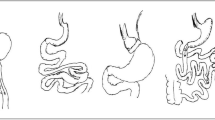Abstract
Background
The aim of this study was to propose dietetic guidelines for the nutritional management of weight regain in Roux-en-Y gastric bypass (RYGB) patients.
Methods
Thirty patients more than 2 years after RYGB surgery were followed up once every 15 days for at least 3 months. We collected from the medical records weight before surgery, excess weight, minimum weight reached 2 years after surgery, and percent of body fat before the operation. Current weight and bioelectrical impedance analysis were assessed at every appointment. The prescribed diet had a low glycemic load with 45% of carbohydrates, 35% of protein (80 g for women and 100 g for men) and 20% of fat, three servings of dairy products, and a supplement of soluble fibers (15 g/day).
Results
The patients had a previous average weight regain of 8 kg (±19). Forty percent of the sample had an excess weight loss (EWL) of less than 50%. After the intervention, 86% of the patients lost weight. The mean weight lost was 1.8 kg in the first month, 1.2 kg in the second month, and 1.3 kg in the third. Half of the sample with unsuccessful weight loss achieved an EWL of at least 50%. The failure rate of the group dropped from 40% to 20%. The percentage of body fat declined from 36.2% to 34% (p < 0.001).
Conclusion
Despite the short period of time, we observed that the nutritional counseling reduced the weight of patients with previous weight regain. There was also a reduction in body fat, which improves the perspective of weight maintenance in the future.


Similar content being viewed by others
References
Sjostrom L, Lindroos AK, Peltonen M, et al. Swedish Obese Subjects Study Scientific Group. Lifestyle, diabetes, and cardiovascular risk factors 10 years after bariatric surgery. N Engl J Med. 2004;351:2683–93.
Stocker DJ. Management of bariatric surgery patient. Endocrinol Metab Clin North Am. 2003;32:437–57.
Brolin RE. Bariatric surgery and long-term control of morbid obesity. JAMA. 2002;288:2793–6.
Silver HJ, Torquati A, Jensen GL, et al. Weight, dietary and physical exercises behaviors two years after gastric bypass. Obes Surg. 2006;16:859–64.
Buchwald H, Avidor Y, Braunwald E, et al. Bariatric surgery: a systematic review and meta-analysis. JAMA. 2004;292(14):1724–37. [Review. Erratum in: JAMA. 2005;293(14):1728.]
Dowd J. Nutrition management after gastric bypass surgery. Diabetes Spectr. 2005;18(2):82–4.
Christou NV, Look D, Maclean LD. Weight gain after short and long limb gastric bypass in patients followed for longer than 10 years. Ann Surg. 2006;244:734–9.
Shah M, Simha V, Garg A. Review: long-term impact of bariatric surgery on body weight, comorbidities and nutritional status. J Clin Endocrinol Metab. 2006;91:4223–31.
Magro DO, Geloneze B, Delfini, et al. Long-term weight regain after gastric bypass: a 5-year prospective study. Obes Surg. 2008;18:648–51.
Lopez PP, Patel NA, Koche LS. Outpatient complications encountered following Roux-en-Y gastric bypass. Med Clin North Am. 2007;91:471–83.
Brolin RE. Weight gain after short- and long-limb gastric bypass in patients followed for longer than 10 years. Ann Surg. 2007;246(1):163–4; author reply 164.
Scopinaro N, Gianetta E, Friedman D, et al. Biliopancreatic diversion for obesity. Probl Gen Surg. 1992;9:362–79.
Sallet PC, Sallet JA, Dixon JB, et al. Eating behavior as a prognostic factor for weight loss after gastric bypass. Obes Surg. 2007;17:445–51.
Botelho CZ, Viana RPT, Fli MF, et al. Registro Fotográfico para inquéritos Dietéticos utensílios e porções. Goiânia: UFG; 1996, pp. 21–63.
Moize V, Geliebter A, Gluck ME. Obese patients have inadequate protein intake related to protein intolerance up to 1 year following Roux-en-Y gastric bypass. Obes Surg. 2003;13:23–8.
O’Neil PM. Assessing dietary intake in management of obesity. Obes Res. 2001;9(5):361–6s.
Bond DS, Evans RK, DeMaria EJ, et al. A conceptual application of health behavior theory in the design and implementation of a successful surgical weight loss program. Obes Surg. 2004;14:849–56.
Wardé-Kamar J, Rogers M, Flancbaum L, et al. Calorie intake and meal patterns up to 4 years after gastric bypass surgery. Obes Surg. 2004;14:1070–9.
Pawlak DB, Ebbeling CB, Ludwig DS. Should obese patients be counselled to follow a low glycaemic index diet? Yes. Obes Rev. 2002;3:235–43.
Howarth NC, Saltzman E, Roberts SB. Dietary fiber and weight regulation. Nutr Rev. 2001;59(5):129–39.
Major GC, Chaput JP, Ledoux M. Recent developments in calcium-related obesity research. Obes Rev. 2008 [Epub ahead of print]
Watanabe S, Doshi M, Hamazaki T. n-3 Polyunsaturated fatty acid (PUFA) deficiency elevates and n-3 PUFA enrichment reduces brain 2-arachidonoylglycerol level in mice. Prostaglandins Leukot Essent Fat Acids. 2003;69(1):51–9.
Metcalf B, Rabkin RA, Rabkin JM, et al. Weight loss composition: the effects of exercise following obesity surgery as measured by bioelectrical impedance analysis. Obes Surg. 2005;15:183–6.
Völgyi E, Tylavsky FA, Lyytikäinen A, et al. Assessing body composition with DXA and bioimpedance : effects of obesity, physical activity and age. Obesity. 2008;16(3):700–5.
Welch G, Wesolowski C, Piepul B, et al. Physical exercises predicts weight loss following gastric bypass surgery: findings from a Support Group Survey. Obes Surg. 2008;18:571–24.
Author information
Authors and Affiliations
Corresponding author
Rights and permissions
About this article
Cite this article
Faria, S.L., de Oliveira Kelly, E., Lins, R.D. et al. Nutritional Management of Weight Regain After Bariatric Surgery. OBES SURG 20, 135–139 (2010). https://doi.org/10.1007/s11695-008-9610-z
Received:
Accepted:
Published:
Issue Date:
DOI: https://doi.org/10.1007/s11695-008-9610-z




